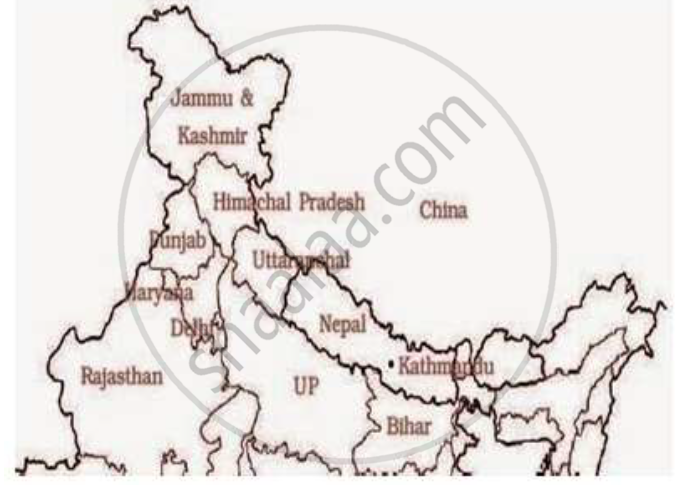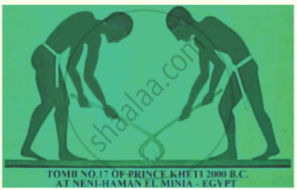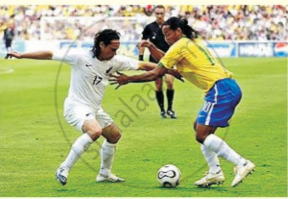Advertisements
Advertisements
प्रश्न
In Act V, Scene I of the play, The Tempest, Ariel reminds Prospero that it was the sixth hour because ______.
उत्तर
In Act V, Scene I of the play, The Tempest, Ariel reminds Prospero that it was the sixth hour because ariel must remind Prospero of the passage of time so that his reconciliation and resolution plans can be carried out on time.
APPEARS IN
संबंधित प्रश्न
The Shehnai of Bismillah Khan Thinking about the text :
Tick the right answer.
The (shehnai, pungi) was a ‘reeded noisemaker.’
Thinking about the Text
On the following map mark out the route, which the author thought of but did not take, to Delhi.

How does Toto come to grandfather’s private zoo?
The poem is about a brook. A dictionary would define a brook, as a stream or a
small river. Read the poem silently first. After the first reading, the teacher will
make you listen to a recording of the poem. What do you think the poem is all
about?
I come from haunts of coot and hern;
I make a sudden sally
And sparkle out among the fern,
To bicker down a valley.
By thirty hills I hurry down,
Or slip between the ridges,
By twenty thorpes, a little town,
And half a hundred bridges.
Till last by Philip's farm I flow
10 To join the brimming river,
For men may come and men may go,
But I go on for ever.
I chatter over stony ways,
In little sharps and trebles,
15 I bubble into eddying bays,
I babble on the pebbles.
With many a curve my banks I fret
By many a field and fallow,
And many a fairy foreland set
20 With willow-weed and mallow.
I chatter, chatter, as I flow
To join the brimming river,
For men may come and men may go,
But I go on for ever.
25 I wind about, and in and out,
With here a blossom sailing,
And here and there a lusty trout,
And here and there a grayling,
And here and there a foamy flake
30 Upon me, as I travel
With many a silvery waterbreak
Above the golden gravel,
And draw them all along, and flow
To join the brimming river
35 For men may come and men may go,
But I go on for ever.
I steal by lawns and grassy plots,
I slide by hazel covers
I move the sweet forget-me-nots
40 That grow for happy lovers.
I slip, I slide, I gloom, I glance,
Among my skimming swallows;
I make the netted sunbeam dance
Against my sandy shallows.
45 I murmur under moon and stars
In brambly wildernesses;
I linger by my shingly bars;
I loiter round my cresses;
And out again I curve and flow
50 To join the brimming river,
For men may come and men may go,
But I go on for ever.
About the Poet
Lord Tennyson (1809-92) was born in Lincolnshire. Poet Laureate for over 40 years, Tennyson is representative of the Victorian age. His skilled craftsmanship and noble ideals retained a large audience for poetry in an age when the novel was engrossing more and more readers. Tennyson's real contribution lies in his shorter poems like The Lady of Shallot, The Princess, Ulysses, The Palace of Art etc. His fame rests on his perfect control of sound, the synthesis of sound and meaning, and the union of visual and musical.
Now dramatise the play. Form groups of eight to ten students. Within each group,
you will need to choose
- a director, who will be overall incharge of the group's presentation.
- the cast, to play the various parts.
- someone to be in charge of costumes.
- someone to be in charge of props.
- a prompter.
Within your groups, do ensure that you - read both scenes, not just your part within one scene if you are acting.
- discuss and agree on the stage directions.
- read and discuss characterization.
- hold regular rehearsals before the actual presentation.
Staging - The stage can be very simple, with exits on either side representing doors to the outside and
to the rest of the house respectively.
The following are the dictionary entries for some of the words that appear in 'The Mystery of Bermuda Triangle'. Study the words and their meanings before you read the mystery for better comprehension.
• Halloween/halau in/ : the night of 31st October when it was believed in the past that dead people appeared from their graves. This is now celebrated in the US, Canada and Britain by children who dress as ghosts and witches.
• vector/'vekta/: an insect or animal which carries a disease from one animal or plant to another; a course taken by an aircraft; a quantity, such as velocity, completely specified by a magnitude and direction.
• crackle/' krak(a)l/: to make short sharp sounds .
• ascent/ a' sent/: the act of climbing or moving up .
• roger/' rod3a /: in communication by radio to show that they have understood a message; an expression of agreement.
• probe/praub/: to ask questions in order to find out some secret or hidden information; an exploratory action; expedition, or device, especially one designed to investigate and obtain information on a remote or unknown region.
• abduct/ ab' dAkt/ : to take somebody away illegally, by using force.
• time warp/ taimwarp /: a situation in which it is possible for people or things from the past or the future to move to the present.
• phenomenon/ fa' nomrnan/: a fact or an event in nature or society, especially one that is not fully understood.
• erratic/ I' rat.Ik/: not happening at regular times.
• engulf /In· g /\ If/,/ &n · g /\ If/: to surround or to cover somebody or something completely.
Read and enjoy :
Hockey 
Do you know when hockey was first played? Research in Ethiopia has discovered that it has been around for more than four millenia. A tablet in Greece has images of young people playing field hockey. Even in South America, Ireland, Egypt, Scotland and Rome, there are proofs and records of this game. The game in these countries was no different than the other even though it was known by different names. Hundreds of years ago, this game was known as 'Hockie' in Ireland and it is this name that has stuck with the game ever since.

While current field hockey appeared in the mid-18th century in England, primarily in schools, it was not until the first half of the 19th century that it became firmly established. Prior to 1980, women were not permitted to take part in this game. The first club was created in 1849 at Blackheath in south-east London. During the 1600s and 1700s, hockey in England was a little dissimilar and it was more disorganised. People from all over the village would take part in the game. It was not unusual for a team to have 60 - 100 players. It was the goal of the team players to get the ball into the common ground of the rival team. This game required quite a few days to finish. Many players suffered injuries. Even though umpires were present, they were not allowed to say anything without the team members' request.
Ultimaty , good judgment prevailed. Firm regulations were introduced. In England, a headmaster restricted the number of players to thirty for one single team, During the 1860s, England's Eton College laid down some rules for the game. Additional rules were introduced afterthe formation of the Hockey Association in the year 1875.
Football
Football refers to a number of similar team sports, all of which involve (to varying degrees) kicking a ball with the foot in an attempt to score a goal. People from around the world have played games which involved kicking and / or canying a ball, since ancient times. However, most of the modern codes of football have their origins in England.

The most popular of these sports worldwide is association football, more comm.only known as just 'Football' or 'Soccer'. It is widely considered to be the most popular sport in the world
The waves beside them danced, but they
Out-did the sparkling leaves in glee;
A poet could not be but gay,
In such a jocund company!
I gazed-and gazed-but little thought
What wealth the show to me had brought:
Read the lines given above and answer the question that follow.
Which wealth is referred to by the poet?
Abou Ben Adhem (may his tribe increase!)
Awoke one night from a deep dream of peace,
And saw, within the moonlight in his room,
Making it rich, and like a lily in bloom,
An angel writing in a book of gold:-
Read the lines given above and answer the following question.
Explain with reference to context.
An old man with steel rimmed spectacles and very dusty clothes sat by the side of the road. There was a pontoon bridge across the river and carts, trucks, and men, women and children were crossing it. The mule-drawn carts staggered up the steep bank from the bridge with soldiers helping push against the spokes of the wheels. The trucks ground up and away heading out of it all and the peasants plodded along in the ankle deep dust. But the old man sat there without moving. He was too tired to go any farther.
Read the extract given below and answer the question that follow.
What does the term “pontoon bridge” mean?
She lighted another match, and then she found herself sitting under a beautiful Christmas-tree. It was larger and more beautifully decorated than the one which she had seen through the glass door at the rich merchant’s. Thousands of tapers were burning upon the green branches, and colored pictures, like those she had seen in the show- windows, looked down upon it all. The little one stretched out her hand towards them, and the match went out.
The Christmas lights rose higher and higher, till they looked to her like the stars in the sky. Then she saw a star fall, leaving behind it a bright streak of fire. “Someone is dying,” thought the little girl, for her old grandmother, the only one who had ever loved her, and who was now dead, had told her that when a star falls, a soul was going up to God.
Read the extract given below and answer the question that follow.
Why did the girl think that “Someone is dying” ?
The women came out on the shore, and made for the stepping—?stones. They had plenty to laugh and bicker about, as they approached the river in a noisy crowd. They girded up their skirts, so as to jump from stone to stone, and they clanked their sickles and forks together over their shoulders to have ease of movement. They shouted their quarrels above the gush of the river. Noise frightens crocodiles. The big mugger did not move, and all the women crossed in safety to the other bank. Here they had to climb a steep hillside to get at the grass, but all fell to with a will, and sliced away at it wherever there was foothold to be had. Down below them ran the broad river, pouring powerfully out from its deep narrow pools among the cold cliffs and shadows, spreading into warm shallows, lit by kingfishers. Great turtles lived there, and mahseer weighing more than a hundred pounds. Crocodiles too. Sometimes you could see them lying out on those slabs of clay over there, but there were none to be seen at the moment.
Read the extract given below and answer the question that follow.
What all lived in the river below the hill?
Describe the professional rivalry and professional friendship of Owens and Long.
Portia: To these injunctions every one doth s'vear That comes to hazard for my worthless self.
Arragon: And so have I address'd me. Fortune now To my heart's hope! - Gold, silver and base lead.
(i) Who had tried his luck in tn; ing to choose the correct casket before the prince of Arragon? Which casket had that suitor chosen? What did he find inside the casket?
(ii) What are the three things Arragon was obliged by the oath to obey?
(iii) What was the inscription on the golden casket? How do the actions of the martlet illustrate this inscription?
(iv) Which casket does Arragon finally choose? Whose portrait does he find inside? Which casket actually contains Portia's portrait?
(v) Who enters soon after? What does he say about the young Venetian who has just arrived? What gifts has the Venetian brought with him?
In which situation is the lead held high? What does he mean by 'knowledge is free'? What are 'narrow domestic walls'?
Discuss the following topic in groups.
“Death in an open field is better than life in a small hut,” Chandni said to herself. Was it the right decision? Give reasons for your answer.
Why did Tilloo’s father advise him not to try to reach the surface of the planet?
Do you think we should help people in need? Why so?
What was the king’s reaction when he came to know that he had lost the challenge?
Why did author preferred boots made by Mr Gessler than that of big firms?
Give some examples of fuel.
Why did Soapy move restlessly on his seat?
Which one of the following sums up the story best?
Complete the following sentence
The chatter is electrical because ______
Is it good to play with snakes which are not very dangerous?
Make noun from the word given below by adding –ness, ity, ty or y
Sad ___________.
In groups of four, discuss the following lines and their meanings.
But only words can free a thought
From its prison behind your eyes
Answer the following question.
What was Jumman’s verdict as head Panch? How did Algu take it?
What is meant by a ‘game of chance’? What lesson did the narrator learn from his experience at the fair?
What does a rebel do when nobody talks during the class?
